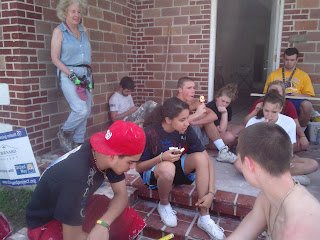Dutch Hodges PCV
US Peace Corps
PO Box 698 - 00621
Village Market
Nairobi, Africa
Fed Ex Works but is very expensive for a small package.
Sunday, May 22, 2011
Monday, May 16, 2011
My work at the Dupres House
My Work at Brenda Dupres House
Brenda and her son and grandson left the area for a while, but were worried about people’s claiming destroyed properties.
The process also includes the planting of our “gulf bags”. We put a quart of root zone humus or mulch full of oil digesting molecules created from cow manure (including everything from mucus and intestinal fluids) phosphate and other amalgam ingredients into non-toxic jute. This mixture has been “cured” at certain temperatures for two years and joins a little cork grass to take hold as a stabilization strategy that is now serving as a remediation effort around the world. The eco ecoli doesn’t like the root humus but any remaining oil on the plants and sandy bottom does. And the soil is nurtured by the new grasses.
There’s a sign in the yard at the house where Brenda Dupres Grew up that says “Roots Run Deep Here”
For Brenda whose father built their home on Gordon Street in the Lower Ninth Ward in the year she was born, it couldn’t be truer. Both sides of her family – her father’s as brick layers and her mother’s as teachers were deeply rooted in the Lower Ninth. So when Katrina flooded the house with 15 feet of water in 2005 (they were rescued on the roof after 3 days) Brenda just didn’t lose the house she had been living in after her parents died; she lost her sanctuary and her father’s legacy (the African American families tend to live in the same house, same block for generations) and her tightknit community.
Brenda and her son and grandson left the area for a while, but were worried about people’s claiming destroyed properties.
Seven weeks after the storm when Brenda returned, it was a scary sight. “Everything was gray” she recalled, two large pines, were down, but the brick foundation still intact. “The houses around the corner were demolished and in the middle of the street.” The entire neighborhood was uninhabitable. Brenda had friends who helped her find places to stay, and she finally found a FEMA trailer but suffered illnesses she believes were caused by it.
Brenda received money from Road Home, but not enough to cover a complete rebuild. She was also afraid of becoming another victim of contractor fraud. She tried to find a reputable contractor and began work on the downstairs of the house, but did not have enough to finish the job. This is when the St Bernard Project comes in. They said yes to her application and she now pays for the materials with her remaining grant.
Every week of my month here new teams of people from around the country arrive to be volunteer workers. Church groups, families, couples, and co-workers with me grab hold of the sheet rock, drill, sand, put on texture, prime, paint, and install windows, and doors. Work on Brenda’s house began in
October and I will see it completed when I leave here May 11. It’s a good thing they are not paying me by the hour, but I’ve managed to become a pro at Uniline laminate flooring, love to use the roto zip drill to trim drywall, and put an Erwin Quick grip on my Christmas list!
The “Gulf Bags”!
In addition to keeping time with a woman called Katrina, I have been working two days a week in wetlands restoration. In the area situated at the southern end of the Mississippi delta are the marshes of the Delta National Wildlife Refuge, an area of bayous, islands and river canals which include the Channel Islands and Breton (one of the oldest designated National Wildlife refuges by Teddy R). Dominated by migratory birds and the important flora and fauna which provide the aquatic habitat for the needs of numerous shellfish and fish species, (redfish, plain ole mullet and the blue crab shrimp) the dynamic landscape has suffered from manmade damage (levees, oil spills) and no longer serves as a natural protector to New Orleans and other coastal communities. New “speed bumps” on the ocean floor are being created by teams of volunteers (that be me) who are hand crafting crevasses or cuts in the floor of the Mississippi and in the channels near the Gulf. This allows the salt laden river water to spread to ponds, water passes and the open water.
The process also includes the planting of our “gulf bags”. We put a quart of root zone humus or mulch full of oil digesting molecules created from cow manure (including everything from mucus and intestinal fluids) phosphate and other amalgam ingredients into non-toxic jute. This mixture has been “cured” at certain temperatures for two years and joins a little cork grass to take hold as a stabilization strategy that is now serving as a remediation effort around the world. The eco ecoli doesn’t like the root humus but any remaining oil on the plants and sandy bottom does. And the soil is nurtured by the new grasses.
Subscribe to:
Posts (Atom)




